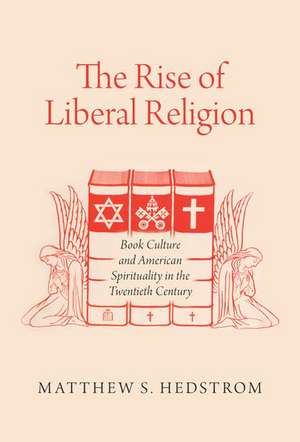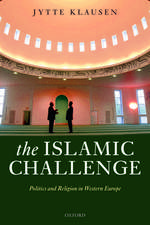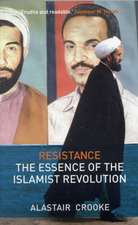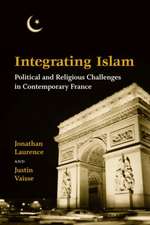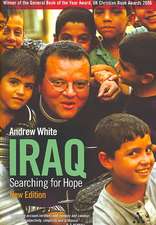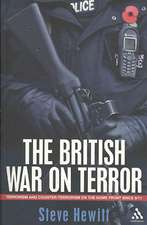The Rise of Liberal Religion: Book Culture and American Spirituality in the Twentieth Century
Autor Matthew S. Hedstromen Limba Engleză Paperback – 19 feb 2015
| Toate formatele și edițiile | Preț | Express |
|---|---|---|
| Paperback (1) | 246.84 lei 32-37 zile | |
| Oxford University Press – 19 feb 2015 | 246.84 lei 32-37 zile | |
| Hardback (1) | 486.00 lei 32-37 zile | |
| Oxford University Press – 20 dec 2012 | 486.00 lei 32-37 zile |
Preț: 246.84 lei
Preț vechi: 289.51 lei
-15% Nou
Puncte Express: 370
Preț estimativ în valută:
47.23€ • 49.42$ • 39.24£
47.23€ • 49.42$ • 39.24£
Carte tipărită la comandă
Livrare economică 24-29 martie
Preluare comenzi: 021 569.72.76
Specificații
ISBN-13: 9780190231231
ISBN-10: 0190231238
Pagini: 290
Ilustrații: 17 illus.
Dimensiuni: 155 x 231 x 25 mm
Greutate: 0.43 kg
Editura: Oxford University Press
Colecția OUP USA
Locul publicării:New York, United States
ISBN-10: 0190231238
Pagini: 290
Ilustrații: 17 illus.
Dimensiuni: 155 x 231 x 25 mm
Greutate: 0.43 kg
Editura: Oxford University Press
Colecția OUP USA
Locul publicării:New York, United States
Recenzii
This is a useful contribution to the study of American religion in the twentieth century.
Hedstrom makes historians view liberal religion beyond institutional criteria of church or denominational growth and decline ... a thoroughly researched and engaging monograph.
I came away from Hedstrom s book with a rich understanding of the culture of midcentury liberal religion ... Hedstrom has set an exciting agenda for future scholars.
Outstanding ... extraordinarily interesting.
Thoughtful and erudite.
This description of the marriage of liberal religion and publishing in the US in the 20th century fuses a deep familiarity with historical archives, sensitivity to the movement of American religious practices, and insightful interpretations of texts and images ... Recommended.
Belongs on the to-read list.
Hedstrom's terrific study suggests that there is much more to the story of religious liberalism in twentieth and twenty-first-century America than the numerical decline of mainline Protestant churches.
Perceptive and compelling. Hedstrom offers a creative spin on a familiar story.
An original and eye-opening study, planting liberal religion in the wider history of liberalism, including its middlebrow culture of print. Hedstrom shows how liberal religion keeps renewing itself by sidling up to secular culture, and by welcoming wave after wave of refugees from orthodoxy on the one hand and agnosticism on the other, all of them drawn to the premise of liberal spirituality that science and religion make excellent bedfellows.
Smart, innovative, and fascinating ... Hedstrom tells a compelling story. He masterfully blends important theoretical insights with an engaging narrative ... This is an excellent, well-written, and transformative study that scholars will be wrestling with for years to come.
Hedstrom's work is highly recommended to students of American religions, those interested in the history of the book, twentieth-century historians, and scholars of spirituality.
Hedstrom shows that the prevailing values of liberal Protestantism were widely disseminated through mass-market, 'middlebrow' books during the middle decades of the twentieth century, influencing ostensibly secular domains of popular culture in ways that no previous scholar has established. This is a strikingly original, crisply argued contribution to cultural and religious history.
Hedstrom dexterously knots together several cultural threads: liberal Protestantism, middlebrow reading habits, corporate publishing, popular psychology, and seeker spirituality. The expectation that the right religious books-mystical, adventuresome, psychologically attuned, and affordable-would arrest modernity's dissolutions was perhaps another instance of liberal Protestantism's unrequited optimism, but Hedstrom makes a compelling case for just how potent this publishing mission was from the 1920s through the 1940s and beyond.
In this engrossing study, Matthew Hedstrom provides nothing less than a series of revelations
Hedstrom brilliantly describes some of the unforseen results of this new complicity between religion and consumer culture.
In the modern age of mass-culture and commoditization, liberal religious intellectuals reasoned that the consumption of good books could make a far-reaching contribution to the spiritual formation of American readers. Matthew Hedstrom delivers a deeply thoughtful and thoroughly researched study that urges us to recognize how liberal religion used mass-culture rather than just sneered at it, and to think hard about reading and spirituality today. The legacy of liberal religion is larger than we might have thought.
Hedstrom makes historians view liberal religion beyond institutional criteria of church or denominational growth and decline ... a thoroughly researched and engaging monograph.
I came away from Hedstrom s book with a rich understanding of the culture of midcentury liberal religion ... Hedstrom has set an exciting agenda for future scholars.
Outstanding ... extraordinarily interesting.
Thoughtful and erudite.
This description of the marriage of liberal religion and publishing in the US in the 20th century fuses a deep familiarity with historical archives, sensitivity to the movement of American religious practices, and insightful interpretations of texts and images ... Recommended.
Belongs on the to-read list.
Hedstrom's terrific study suggests that there is much more to the story of religious liberalism in twentieth and twenty-first-century America than the numerical decline of mainline Protestant churches.
Perceptive and compelling. Hedstrom offers a creative spin on a familiar story.
An original and eye-opening study, planting liberal religion in the wider history of liberalism, including its middlebrow culture of print. Hedstrom shows how liberal religion keeps renewing itself by sidling up to secular culture, and by welcoming wave after wave of refugees from orthodoxy on the one hand and agnosticism on the other, all of them drawn to the premise of liberal spirituality that science and religion make excellent bedfellows.
Smart, innovative, and fascinating ... Hedstrom tells a compelling story. He masterfully blends important theoretical insights with an engaging narrative ... This is an excellent, well-written, and transformative study that scholars will be wrestling with for years to come.
Hedstrom's work is highly recommended to students of American religions, those interested in the history of the book, twentieth-century historians, and scholars of spirituality.
Hedstrom shows that the prevailing values of liberal Protestantism were widely disseminated through mass-market, 'middlebrow' books during the middle decades of the twentieth century, influencing ostensibly secular domains of popular culture in ways that no previous scholar has established. This is a strikingly original, crisply argued contribution to cultural and religious history.
Hedstrom dexterously knots together several cultural threads: liberal Protestantism, middlebrow reading habits, corporate publishing, popular psychology, and seeker spirituality. The expectation that the right religious books-mystical, adventuresome, psychologically attuned, and affordable-would arrest modernity's dissolutions was perhaps another instance of liberal Protestantism's unrequited optimism, but Hedstrom makes a compelling case for just how potent this publishing mission was from the 1920s through the 1940s and beyond.
In this engrossing study, Matthew Hedstrom provides nothing less than a series of revelations
Hedstrom brilliantly describes some of the unforseen results of this new complicity between religion and consumer culture.
In the modern age of mass-culture and commoditization, liberal religious intellectuals reasoned that the consumption of good books could make a far-reaching contribution to the spiritual formation of American readers. Matthew Hedstrom delivers a deeply thoughtful and thoroughly researched study that urges us to recognize how liberal religion used mass-culture rather than just sneered at it, and to think hard about reading and spirituality today. The legacy of liberal religion is larger than we might have thought.
Notă biografică
Matthew S. Hedstrom is Assistant Professor of American Studies and Religious Studies at the University of Virginia.
